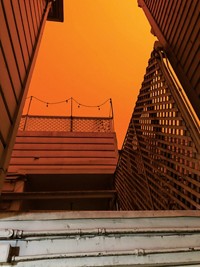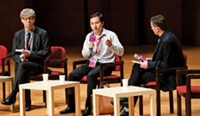Advertisement
Grab your lab coat. Let's get started
Welcome!
Welcome!
Create an account below to get 6 C&EN articles per month, receive newsletters and more - all free.
It seems this is your first time logging in online. Please enter the following information to continue.
As an ACS member you automatically get access to this site. All we need is few more details to create your reading experience.
Not you? Sign in with a different account.
Not you? Sign in with a different account.
ERROR 1
ERROR 1
ERROR 2
ERROR 2
ERROR 2
ERROR 2
ERROR 2
Password and Confirm password must match.
If you have an ACS member number, please enter it here so we can link this account to your membership. (optional)
ERROR 2
ACS values your privacy. By submitting your information, you are gaining access to C&EN and subscribing to our weekly newsletter. We use the information you provide to make your reading experience better, and we will never sell your data to third party members.
Genomics
Science in the headlines: Gene-edited babies and climate change
by Bibiana Campos Seijo
December 2, 2018
| A version of this story appeared in
Volume 96, Issue 48
What a crazy week last week was. Science was at the forefront—not in a positive way, unfortunately—and completely dominated the news cycle. There were two main stories: gene-edited babies and climate change.
The crunch point that many had foreseen regarding the ethical use of gene editing finally arrived last week, earlier than most had predicted. Geneticist He Jiankui of China’s Southern University of Science and Technology claimed that he had used CRISPR/Cas9 gene editing to create HIV-resistant human embryos and implanted them in a surrogate, who gave birth to the resulting twin baby girls just weeks ago. He made the announcement in a series of YouTube videos released ahead of the Second International Summit on Human Genome Editing in Hong Kong. The announcement prompted an outcry from scientists who raised concerns about the transparency of the experiment and the ethics of using gene editing to preemptively treat a disease that people may never acquire in the first place.
It’s a highly sensitive situation that has the potential to damage the general public’s perception of gene editing and their support of the technology for treating human disease. I invite you to read our coverage ,starting on page 6, and send us your thoughts. Also, turn to page 36 of our 2018 Year in Pharma package for more on gene editing’s potential for treating genetic disease. A number of companies are getting ready to start clinical trials of CRISPR-powered treatments.
My view of He’s stunning revelation is best summarized by something the Broad Institute of MIT and Harvard’s David R. Liu told C&EN. He said that He’s work “represents a serious breach of ethics that I hope will serve as a wake-up call for the community.” The question is: What is the community going to do about it?
Climate change also made headlines last week. The coverage was spurred by the release of dire scientific assessments ahead of the United Nations climate conference that started Dec. 2 and will continue for the next two weeks, with negotiators from participating nations gathered in Katowice, Poland. Turn to page 18 to read about the dire humanitarian and economic predictions contained in that report and others and why they’ve spurred renewed calls for governments to update their commitments. We chose to title our story “The Heat Is On,” while The New York Times on Twitter warned of “deadly heat, spreading diseases, overwhelmed hospitals,” summarizing the ominous consequences we face if countries choose inaction.
According to the Fourth National Climate Assessment extreme wildfires will be more frequent if climate change is not contained. The deadly fires that affected California in November are a stark reminder. As temperatures rise, droughts and fires will be more likely, and regions that have a fire season may see it extend throughout the year.
Beyond the loss of life and property, the fires are damaging in many other ways. I was in the San Francisco Bay Area in November, and even though the Camp Fire was hundreds of kilometers away, I had difficulty breathing. Authorities warned people to remain inside, and schools and universities canceled classes. Our water supplies may also be at risk. Scientists are racing to determine what part of the cocktail of chemicals that resulted from burning cars, houses, and businesses reached California’s rivers and waterways (see page 8). The environmental risk of this pollution is difficult to quantify. But one thing is clear: wildfires will happen again.
Advertisement
Views expressed on this page are those of the author and not necessarily those of ACS.




Join the conversation
Contact the reporter
Submit a Letter to the Editor for publication
Engage with us on Twitter